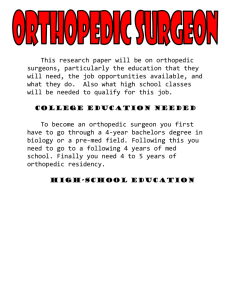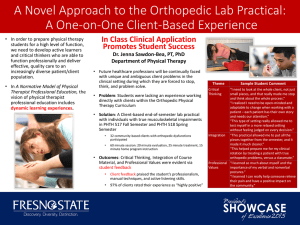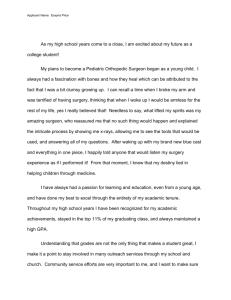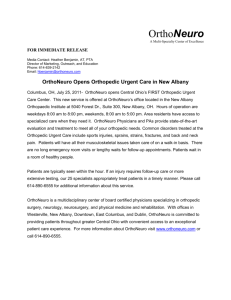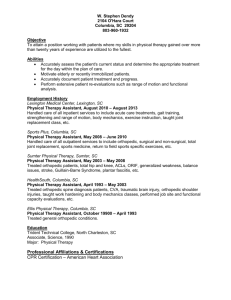ORTHOPEDIC ROTATION: COMPETENCY-BASED GOALS AND OBJECTIVES
advertisement
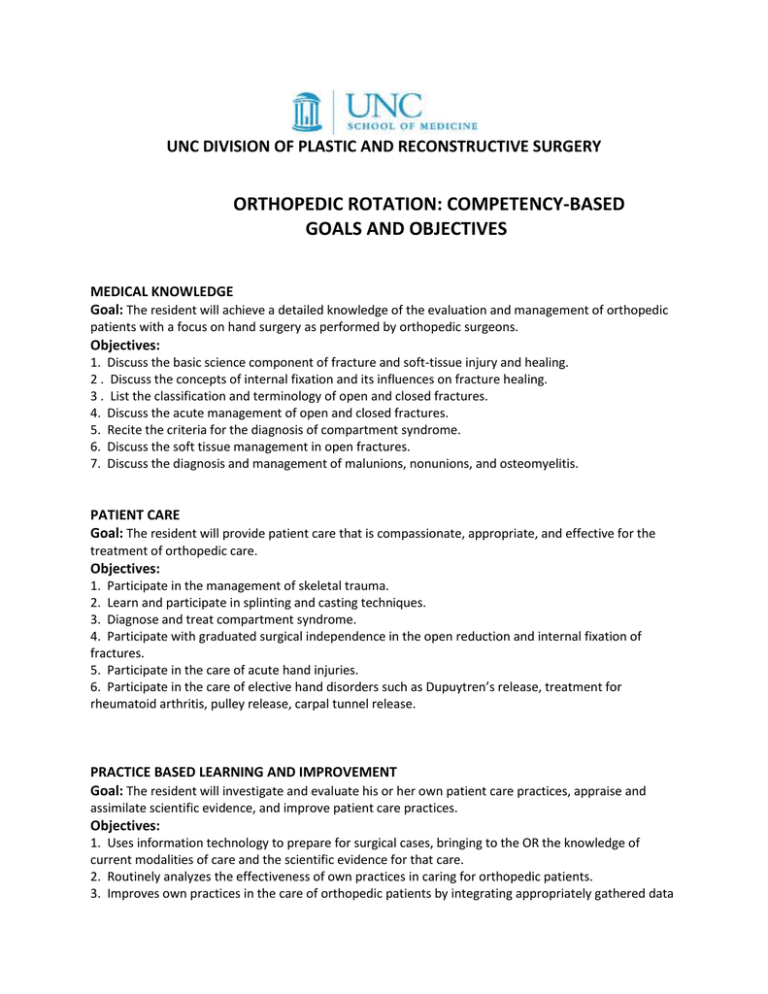
UNC DIVISION OF PLASTIC AND RECONSTRUCTIVE SURGERY ORTHOPEDIC ROTATION: COMPETENCY-BASED GOALS AND OBJECTIVES MEDICAL KNOWLEDGE Goal: The resident will achieve a detailed knowledge of the evaluation and management of orthopedic patients with a focus on hand surgery as performed by orthopedic surgeons. Objectives: 1. Discuss the basic science component of fracture and soft-tissue injury and healing. 2 . Discuss the concepts of internal fixation and its influences on fracture healing. 3 . List the classification and terminology of open and closed fractures. 4. Discuss the acute management of open and closed fractures. 5. Recite the criteria for the diagnosis of compartment syndrome. 6. Discuss the soft tissue management in open fractures. 7. Discuss the diagnosis and management of malunions, nonunions, and osteomyelitis. PATIENT CARE Goal: The resident will provide patient care that is compassionate, appropriate, and effective for the treatment of orthopedic care. Objectives: 1. Participate in the management of skeletal trauma. 2. Learn and participate in splinting and casting techniques. 3. Diagnose and treat compartment syndrome. 4. Participate with graduated surgical independence in the open reduction and internal fixation of fractures. 5. Participate in the care of acute hand injuries. 6. Participate in the care of elective hand disorders such as Dupuytren’s release, treatment for rheumatoid arthritis, pulley release, carpal tunnel release. PRACTICE BASED LEARNING AND IMPROVEMENT Goal: The resident will investigate and evaluate his or her own patient care practices, appraise and assimilate scientific evidence, and improve patient care practices. Objectives: 1. Uses information technology to prepare for surgical cases, bringing to the OR the knowledge of current modalities of care and the scientific evidence for that care. 2. Routinely analyzes the effectiveness of own practices in caring for orthopedic patients. 3. Improves own practices in the care of orthopedic patients by integrating appropriately gathered data and feedback. 4. Educates medical students and other healthcare professionals in the practices of orthopedic surgery. 5. Functions independently with graduated advancement and appropriate faculty supervision. 6. Uses library sources to perform research and perform literature searches. 7. Understands the principles of clinical research and the application of biostatistics. INTERPERSONAL AND COMMUNICATION SKILLS Goal: The resident will demonstrate interpersonal and communication skills that result in effective information exchange and teaming with patients, their families, and professional associates. Objectives: 1. 2. 3. 4. 5. 6. Educates patients and their families in post operative and rehabilitative strategies. Demonstrates compassion for patients and families afflicted with trauma. Provides adequate counseling and informed consent to patients. Listens to patients and their families. Assimilates data and information provided by other members of the health care team. Charts and records accurate information. SYSTEM BASED PRACTICE Goal: The resident will demonstrate an awareness of and responsiveness to the larger context and system of health care and the ability to effectively call on system resources to provide care that is of optimal value. Objectives: 1. Coordinates all aspects of the rehabilitation of the orthopedic surgery patient. 2. Direct the rehabilitation of orthopedic surgery patients by partnering with the following: a. Physical Therapy b. Occupational Therapy c. PRM Physicians d. social workers e. nutritionalists 3. Demonstrates knowledge of cost-effective orthopedic care. 4. Advocates for orthopedic surgery patients within the health care system. 5. Refers orthopedic patients to the appropriate practitioners and agencies. 6. Facilitates the timely discharge of orthopedic surgery patients. 7. Works with paramedical professionals in the prehospital care of trauma patients. PROFESSIONALISM Goal: The resident will demonstrate a commitment to carrying out professional responsibilities, adherence to ethical principles, and sensitivity to a diverse patient population. Objectives: 1. Develops a sensitivity of the unique stresses placed on families under care for traumatic orthopedic injuries. 2. Exhibits an unselfish regard for the welfare of orthopedic surgery patients. 3. Demonstrates firm adherence to a code of moral and ethical values. 4. Is respectful to hand patients and their families especially in times of trauma and stress to the family unit. 5. Respects and appropriately integrates other members of the orthopedic surgery team. 6. Provides appropriately prompt consultations when requested. 7. Demonstrates sensitivity to the individual patient’s profession, life goals, and cultural background as they apply to orthopedic care. 8. Is reliable, punctual, and accountable for own actions in the OR and clinic. 9. Understands the concepts of autonomy, beneficence, nonmalificence, justice, and respect for life. 10. Maintains patient confidentiality.
